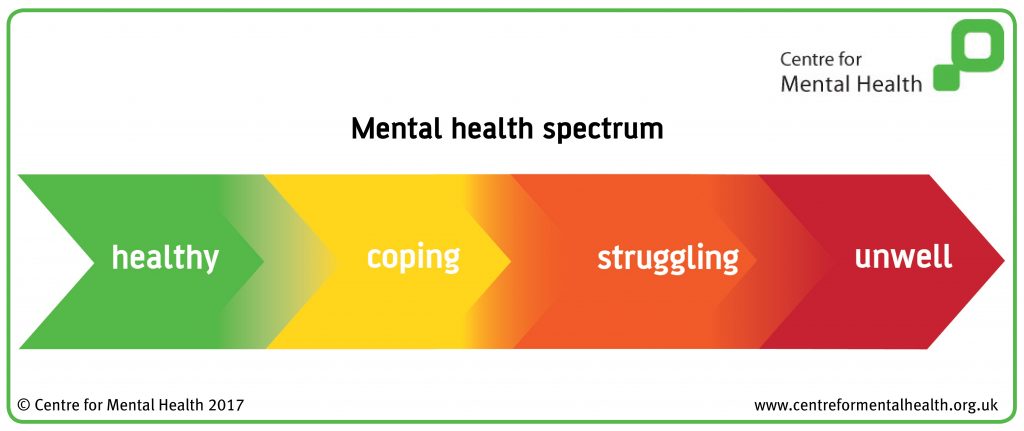This is an original piece of content about how to hit sales target through optimal Mental Health was co-written by The Sales Health Alliance and Starts With Me.
Over the past five years, there has been a lot of “talk” and promotion surrounding the value of mental health in the workplace. The question we want to understand is; why are things not getting better? And, how do we move from talking into action?
The large marketing campaigns about mental health can inspire, but only for a short period of time. Our optimism is restricted, because the talk is limited to special days and occasions throughout the year. We need to move beyond talk and show people and organizations how to navigate this troublesome situation.
People’s fear of being honest about their mental health feeds a pattern of stigma and avoidance. No one wants to talk and no one wants to listen.
92% of people with mental health conditions believe that admitting these conditions in the workplace would damage their career.(Delloite)
But can you blame them?
56% of people would not employ an individual who had a history of depression, even if they were the most suitable candidate.(Delloite)
No one is to blame. Developing the courage to face your suffering is difficult. Add the discomfort of accepting the suffering of someone else and knowing how to help them, is one part of this complex situation.
We seem to be losing our ability to understand our emotions, thoughts, and how to communicate those to others. The solution lies in reducing the fear of opening up, which can only happen once we develop the awareness and the knowledge of how to do so.
Why Helping Sales Teams Hit Sales Target Is A Good Start
The World Economic Forum estimates that mental health problems will cost the global economy approximately $6 trillion by 2030. Action is needed and prioritizing the mental health of your sales team is a good place for your organization to start. Here is why.
Salespeople, more than other employees, face constant pressure to perform. They have days filled with rejection, anxiety, stress, endorphin rushes and mood swings.
A deal will close one minute and the next, a “sure thing deal” falls through. Newer salespeople may feel overwhelming dejection, while tenured salespeople tend to dive back into their pipeline trying to rescue or chase down lost revenue.
All to reach the ultimate goal – hit sales target and the lucrative commission cheques that come with it.
It’s exciting, intoxicating and emotionally exhausting for even the most hardened sales veterans. We suspect this environment creates a higher number of salespeople struggling with their mental health compared to the average employee.
The mental health spectrum helps us understand how the mental health of a salesperson can fluctuate on a daily basis. At any point throughout the day, week, month, etc, we can move across this spectrum. Emotional intelligence and self-awareness can help to navigate the stress of working in sales.

Without the proper awareness, behaviour and support system the daily stresses of sales can lead to a variety of challenges for any organization.
Sales Mental Health Terminology
Here are some common terms gaining more attention (World Health Organization).
- Absenteeism:
- Increase in overall sickness, absence.
- Poor health (depression, stress, burnout).
- Physical conditions (high blood pressure, heart disease, ulcers, sleeping disorders, skin rashes, headache, neck and back ache, low resistance to infections).
- Presenteeism – Work Performance:
- Reduction in productivity and output.
- Increase in error rates.
- Increased in accidents.
- Poor decision making.
- Deteriorating planning and control of work.
- Staff attitude and behaviour:
- Loss of motivation and commitment.
- Burnout.
- Working longer hours but diminishing returns.
- Poor timekeeping.
- High turnover.
- Relationships at Work:
- Tension and conflicts between colleagues.
- Poor relationships with clients.
- Increase disciplinary problems.
Now, the pressure salespeople face need not be a bad thing. Stress and pressure push salespeople to achieve great things – but too much, causes them to breakdown.
According to a Nationwide survey by Morneau Shepell, 83% of Canadians believe stress itself is not universally negative, asserting that workplace stress can be positive or negative depending on how the workplace supports and responds to the employee.
The National Standard for Psychological Health and Safety in the Workplace, further supported this claim:
“Workplaces with a positive approach to psychological health and safety on average are better able to recruit and retain talented workers. Additionally, worker engagement increases, enhances productivity and are more innovative leading to higher profit.”
Data shows the benefit of addressing Mental Health, but 77% of Canadians still do not feel comfortable talking about Mental Health in the workplace.
Why Is This Number So High?
Stigma and the lack of skilled training prevent the creation of mental health programs at scale. The purpose of our work is to create solutions to these barriers and to soften the clutch of silence that is common in the competitive nature of ‘Sales Culture’.
Salespeople can never be weak, depressed, sick or miss target if they want success. They must be infallible.
Vulnerability shown by salespeople is often viewed as a direct sign of weakness. This makes it is hard for them to be honest when their career is closely linked to performance.
When salespeople fall behind their forecasts, organizations tend to forget that they are a colleague and are treated more like a number on a dashboard.
Salespeople are pushed, pulled and stretched to perform with little consideration of this stress on their well-being. Empathy towards their personal struggles is overlooked because the company must meet target – no matter what.
The Sales Floor and Why It’s Hard to Hit Sales Target
In our highly connected world, we are losing our ability to pause, slow down and have meaningful conversations with each other. It seems that we can’t even acknowledge that we are lost in unawareness.
The rise in open office concepts is not bringing about the increased communication and employee engagement we hoped it would. Read more in this fascinating study from Harvard.
Open environments are not new to sales. There has always been the “sales bullpen” or “sales floor” that carries infectious energy when salespeople are pitching. With the walls down, privacy is restricted and everyone must be “ON” all the time.
These days conversations with customers, managers and colleagues rarely happen face to face. They have been replaced by digital communication under the assumption of improving productivity. These tools turn human experience into emoticons and remove non-verbal communication.
The digital channels create more problems than they solve. According to research, up to 80% of human interaction is done through non-verbal cues. This means they can only occur in face to face interactions. As a result, it is not surprising that when mental health challenges arise, individuals feel lonely and are left to confide in a hug emoji.
Workplace Benefits
Workplaces can benefit from creating opportunities to have difficult face to face conversations onsite.
One primary benefit of dialogue, is practicing how to think through problems. Conversations will help salespeople learn how to regain perspective. Learn how to balance their mental health after stressful moments throughout the day.
Without these opportunities, salespeople often turn to after-work trips to the bar where they can vent and decompress. Though a pint with friends can be fun, it is rarely conducive to solving emotional and psychological problems.
It can be difficult to have a thorough understanding of how these suppressed emotions and fluctuations in mental health are draining productivity, engagement and retention.
What to Do? Where to Start? How to Use Mental Health to Hit Sales Target?
Sales organizations that acknowledge and action change around Mental Health stigma have the potential to unlock the full potential of their sales team. Doing so will help them hit sales target more often.
Research from PricewaterhouseCoopers has shown an average of 230% return on every dollar invested in creating a mentally healthy workplace. This represents a 33% decrease in absenteeism, presenteeism and disability claims.
The Mental Health Commission also confirmed their research. They stated improving mental health in the workplace can decrease productivity losses by as much as 30%.
Sales productivity, engagement and employee retention is connected to revenue generation. Sales KPIs are measured closely, which means efforts to improve mental health in salespeople can be measured through these same metrics.
We must create experiential learning opportunities. These experiences help salespeople build resilience, become mentally fit, and more self-aware. The Sales Health Alliance and Starts With Me have partnered to create mental health training programs for salespeople that do exactly that. We teach practices to help reduce short and long-term disabilities claims, absenteeism and presenteeism within sales.
Motivating our work is a sincere desire to help people become healthier human beings and ultimately to create a more prosperous and cohesive world. Drawing from our personal and professional experience, we have put every ounce of effort and desire to bring forth a program that can change lives. We hope to meet and work alongside you on this journey.
If you want to explore the mental health workshop for your sales team or organization please contact us.
Contact Us – WorkshopWritten by Jeff Riseley and Mike Stroh
About The Author
 Jeff Riseley is currently the Founder of the Sales Health Alliance and Mental Health Advocate. With over a decade of sales experience – Jeff understands the importance of Mental Health in achieving peak sales performance.
Jeff Riseley is currently the Founder of the Sales Health Alliance and Mental Health Advocate. With over a decade of sales experience – Jeff understands the importance of Mental Health in achieving peak sales performance.
Jeff combines his sales (Sales Mentor Alliance) and Mental Health expertise to improve sales performance through a mix of sales mentorship and mental health best practices. His strategies have helped sales teams improve their sales process, while helping them become more motivated, resilient and better equipped to tackle stressful events within sales.
He is currently delivering these strategies through on-site workshops, coaching and speaking engagements. To explore working with Jeff contact him at [email protected]





1 Comment
Pingback: What Events In Sales Impact Mental Health The Most? - Sales Health Institute